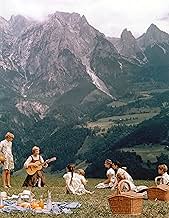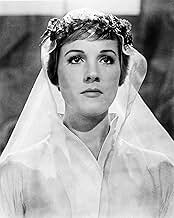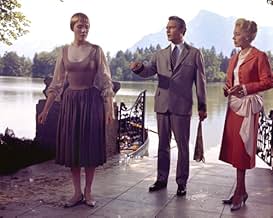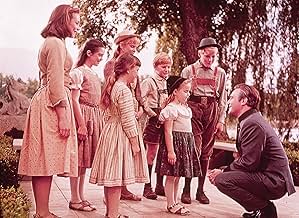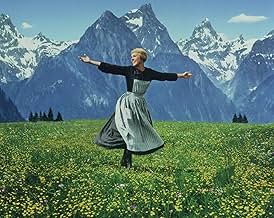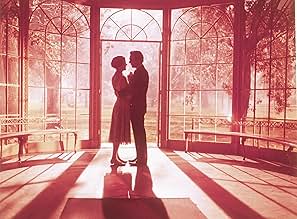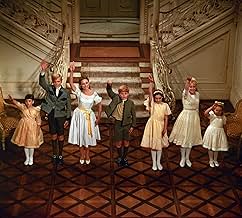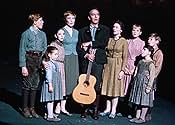Una mujer abandona un convento austríaco para convertirse en la aprendiz de los hijos de un oficial naval viudo.Una mujer abandona un convento austríaco para convertirse en la aprendiz de los hijos de un oficial naval viudo.Una mujer abandona un convento austríaco para convertirse en la aprendiz de los hijos de un oficial naval viudo.
- Dirección
- Guionistas
- Elenco
- Ganó 5 premios Óscar
- 19 premios ganados y 13 nominaciones en total
Heather Menzies-Urich
- Louisa von Trapp
- (as Heather Menzies)
Gilchrist Stuart
- Franz
- (as Gil Stuart)
Resumen
Reviewers say 'The Sound of Music' is cherished for its iconic songs, enchanting performances, and stunning visuals. Themes of love, family, and freedom resonate deeply, though the film's portrayal of Nazism is criticized. Julie Andrews and Christopher Plummer deliver standout performances, while the cinematography is lauded. However, some find the sentimentality, pacing, and character depth lacking. Despite these critiques, its cultural impact and emotional resonance endure.
Opiniones destacadas
Let me confess I'm not a Catholic, I don't have children, I can't stand schmaltz and yet I love The Sound Of Music. I've tried to explain this to myself, let alone to others, without ever finding a satisfactory answer. Yesterday I sat to see it again with a group of kids who hadn't seen it before. They all loved it even the ones who loved Transporters. I asked them afterwards why did they loved it so much and a 12 year old boy's reply was: "It makes you feel alive" Wow, I thought, Wow! Of course, that's what I felt too and a 12 year old found the perfect words to express my feelings. Julie Andrews is a the center of this little miracle. She is Sister Maria and her wishes, thoughts and fears are recognizable automatically, because they are, in many ways, my same wishes, thoughts and fears. Perfect. Thank you.
The Sound of Music (1965) is an all time classic family musical that has always been one of my favorites. Ever since I was child, I would watch this movie and just love every minute of it. This movie really was destined for greatness from the beginning, anyone at all could have seen that. Between the A list cast, great performances, top notch singing, and the enchanting story.... there's no wonder people still love it to death. Julie Andrews stars as Maria, who is a nun, but not a very good one, and she gets sent to be a governess to the Von Trapp family. The Von Trapp family is a very well to do family in Austria. The father is a former captain and the mother died some time ago. Christopher Plummer plays captain Von Trapp, and he does a great job. Every member of the cast does a great job with their performances, both singing and non. The singing alone in this film is just astounding, every single musical number is just as good, if not better than the previous one. If you do not care for musicals, then I wouldn't really suggest this movie to you. It really is a lot of singing, but it is great singing by talented artists, which is really why it will forever have a place in classic great cinema. 10/10 for The Sound of Music. Enchanting story with lovely entertaining music.
The "Sound of Music" is set in the mountainous hills and the city of Salzburg, Austria. There is to my eye at least, something about its spacious alpine countryside which dominates and informs the entire production. The air, the light, the music, the styles of dress, the activities--everything is "elevated", with hardly anything being sea-level about it. And the film has a very good "engagement sequence" at the opening, when we learn about the central ethical character and experience her leaving the abbey where she has served along with her, and begin to care about her purposes. The story-line is simple and relatively direct: A young nun, unsuited to the profession, takes a job as a governess to the children of a difficult client--a captain in the Austrian navy who runs the household like a ship's company of sailors, complete with a bosun's whistle and a lineup of the children in matching uniforms. The body of the piece is then concerned with Maria, the governess, subverting the household and winning over the Captain until he gives up his present lady friend, a Baroness; then when Maria, who has been falling in love with him, goes away and comes back, he has to tell her he is in love with her also. They marry, to the children's delight in a great ceremony in a rebuilt replica of Salzburg's cathedral; but a Nazi Parrty official has words with the Captain. The family, against the Captain's former feeling, then enters the Sazlburg musical festival as the Von Trapp Family singers, something he had earlier opposed; and, winning the contest, they flee and are helped at her old abbey by Maria's Prioress and her friends there. The nuns sabotage the Nazis' cars by stealing parts, and Captain Von Trapp leads his family up over the mountain pass to freedom as the film ends. This happy film is filled with tuneful songs ranging from the ultra-simple "Eidelweiss" ballad to "How Do You Solve a Problem Like Maria" , "Do Re Mi", "My Favorite Things", "The Sound of Music", "I Have Confidence", "The Lonely Goatherd", "Something Good", "Sixteen Going on Seventeen" and the voice-challenging "Climb Every Mountain". Robert Wise directed this complex film, which features many sorts of scenes. Everything to me looks clean, bright and, frequently, even Austrian. Ernerst Lehman wrote the screenplay from the Broadway "book" by Howard Lindsay and Russell Crouse that borrowed its fictionalized biography from Maria Augusta Trapp's autobiographical work; Richard Rodgers and Oscar Hammerstein II supplied the music and lyrics. Ted McCord provided lucid cinematography, with the production being designed by Boris Leven. Ruby R. Leavitt and Walter M. Scott did the complex set decorations while famous Dorothy Jeakins created the many vivid costumes. In the large cast, Julie Andrews was a charming Maria, though she was not particularly Austrian. Christopher Plummer had some very good moments as the Captain, Eleanor Parker played the Baroness with great skill and Richard Haydn was the Captain's impresario friend, Max. Ben Wright was the Nazu gauleiter, Peggy Wood the Mother Superior, and among the nuns were Anna Lee, voice-dubbing soprano Marni Nixon, Evadne Baker and Portia Nelson., In the cast also were Daniel Truhitte, Norma Varden, Gilchrist Stuart as Franz the butler, with the children Charmian Carr, Nicholas Hammond, Angela Cartwright, Heather Menzies, Duane Chase, Debbie Turner, and Kym Karath. It is a bit difficult for me as a writer to account for the highly-positive qualities of the film, since in my judgment they exceed the sum of the film's parts. The characters and relationships seem real to the viewer, I suggest, because we discover them along with Maria; her personal dilemmas are interesting, and the use of the Nazi Anschluss as a threat, a problem for the Captain, and a dark cloud hanging over the sunlit lives of the folk in the film works very well. The contrast for instance between the nuns' early disagreement over Maria's character and their helping to thwart the Nazis pursuing the family at the film's climax becomes a highly-symbolic movement; and like the growing love between Maria and the Captain and the children's being won over by their new governess, because the movement again is allowed to develop by slow stages, the satire-level comedy with its touch of drama works powerfully on an audience. There is much to be admired in the simplicity and the beautiful imagery of this film; if it is not an artistic masterpiece, it is frequently absorbing, moving and unaffected all at the same time.
Has Julie Andrews ever appeared on film more beautifully than in this film? Has she ever sung with such richness and gusto as is captured here? As a big fan of hers, I can watch this musical over and over and just sigh.
Wise and his cinematographer have photographed Andrews in a manner that no other director has--even her husband. Watch the scene where Maria watches the Captain sing Edelweiss with the kids. Wise turns her into a gauzy angel. It is a fantastic moment among hundreds that this movie contains.
I am firmly in a camp that says Julie Andrews was completely, utterly, and regrettably robbed when the 1965 Oscars were handed out. She embodied Maria Von Trapp, wholly and with every fiber of her being (just watch the scene in which she races the boys in a segment of "Do-Re-Mi"; she runs at the camera with utter abandon here, no holding back. Or consider the shot at the end of this song, where she places her hand atop her head--it's as if even SHE can't believe she's hitting that note).
The Julie Christie performance that beat Andrews is now all but forgotton. "The Sound of Music," however, lives on and on.
"The Sound of Music" is a bit bittersweet for me, given that audiences tastes would soon turn away from big-budget musicals in general and Julie Andrews specifically. But what a legacy it (and she) have left!
Wise and his cinematographer have photographed Andrews in a manner that no other director has--even her husband. Watch the scene where Maria watches the Captain sing Edelweiss with the kids. Wise turns her into a gauzy angel. It is a fantastic moment among hundreds that this movie contains.
I am firmly in a camp that says Julie Andrews was completely, utterly, and regrettably robbed when the 1965 Oscars were handed out. She embodied Maria Von Trapp, wholly and with every fiber of her being (just watch the scene in which she races the boys in a segment of "Do-Re-Mi"; she runs at the camera with utter abandon here, no holding back. Or consider the shot at the end of this song, where she places her hand atop her head--it's as if even SHE can't believe she's hitting that note).
The Julie Christie performance that beat Andrews is now all but forgotton. "The Sound of Music," however, lives on and on.
"The Sound of Music" is a bit bittersweet for me, given that audiences tastes would soon turn away from big-budget musicals in general and Julie Andrews specifically. But what a legacy it (and she) have left!
1965's "The Sound of Music" is everything a bad musical should be. Providing more sap than a forest full of Vermont maples, it has coy, silly songs, an inane, innocuous script, and unbelievably sugary characters. So why is it one of my favorite musicals? OK, go ahead. Shoot me at twenty paces. But after all this time, it still remains a guilty pleasure. I find myself going for a tub of rocky road ice cream and Rodgers & Hammerstein's immortal classic whenever the real world gets to be too much. I seem to play it a lot around tax time.
And I'm not alone. Why is it still considered the most popular musical of all time? Well, first of all they spared no expense. The extremely well-produced blockbuster has gorgeous, eye-popping scenery. From the first moment Julie Andrews flails her arms and circles around on that beautiful sunny hillside singing the rousing title song, I know I'm being swept away to another world. I'm not in Kansas anymore...or L.A., anyway. The panoramic Salzburg background complements and never intimidates or takes away from the characters or their story (like the other R & H extravaganza "South Pacific.") That in itself is an incredible feat.
Now about those songs. Almost every one of them is absolute drivel. So what makes them work? Easy. The utter joy and sincerity of the cast who sings the infectious, hummable tunes, which are backed by extremely moving orchestrations and an exceptionally beautiful score. It's hard to resist Maria prancing about, pillow-fighting with a bunch of knee-highs and gushing about her most favorite things. Or the austere Captain Von Trapp (the meticulous Christopher Plummer) turning to butter after hearing his brood sing in perfect harmony for the first time (with no prior lessons even) and joining right in. Or the Mother Superior's soaring number that unknowingly forewarns Maria to head for the hills (I mean, mountains) before the Nazis escort them elsewhere. Or the 16-year-old going on 17 squealing with delight after receiving her first kiss. Or the kids working up a clever little ditty to leave their formal party guests when its time for bed. Or two people declaring their love in a moonlit gazebo. The songs work because they come straight from and aim for the heart, not the head, which is exactly the place the viewer should be coming from when watching this movie. If the songs don't transcend the script (which they didn't prior to the 70s), they certainly transcend the mood.
The script is undeniably trite and probably the film's weakest link. But again, the characters play it straight all the way. Not one actor looks embarrassed. Every scene is done with total enthusiasm and total commitment, and the performers who are telling the story are pitch-perfect and picture perfect.
And as for the characters. Try and think of anybody better than jubilant, crop-haired Julie Andrews as a postulant nun who has gorgeous pipes, can make play clothes out of curtains, can set up and operate marionette shows at the drop of a hat, and is confident enough to convince a man that a failed nun is ideal marriage material. I certainly can't. Thank heavens for her Oscar-winning "Mary Poppins" the year before or we might have gotten Julie LONDON instead! After all, Andrews did lose out on "My Fair Lady" the year before. But now certifiably bankable, she proved she could handle this dream role. Andrews is cutely silly, cutely stubborn, cutely astute, cutely shattered and cutely...well, cute. She gives the most wholesomely appealing musical perf since Judy Garland in "The Wizard of Oz." To actually make you forget Mary Martin in the Broadway role takes some doing and she does it effortlessly. Christopher Plummer is all seriousness, handsomely patrician, and quite a catch for anybody...much less a nun. I can't think of anyone more suitable for this role either. As for the Seven Little Foys, I mean the Von Trapp children, they are adorable and perfect in their own ways too, whether they are marching or singing, creating their own individual personalities by film's end.
Richard Haydn as Max and Eleanor Parker as the flamboyant, haughty Baroness provide wonderful catty relief. Despite having their musical numbers snatched away from them, they make up for it with droll, sophisticated humor. The elegant, perfectly coiffed Parker is particularly delicious as Maria's chief romantic rival, getting some of the film's best zingers and delivering them with biting understatement. Parker developed a devout cult following after this role. Peggy Wood's Mother Superior is suitably reverent and inspiring.
For those who tear "The Sound of Music" apart for its shameless, sugar-coated manipulations, well, I can respect that. But to attack it for its political and historical inaccuracies is like attacking "Peter Pan" for being a subversive plot that encourages young children to run away from home. It's ludicrous. Despite the fact that it's based on a true story, we're not watching "The Sound of Music" for stark realism. Like a sparkling and lavish Ernst Lubitsch operetta, we want a feel-good movie, with feel-good songs, with a feel-good story, and a feel-good ending. Nothing more. If you want a movie that presents a potent depiction of pre-war Austria or anti-Nazi sentiment, rent "Holocaust" or "Schindler's List." Here, we want to believe that a group of nuns can tear out an automobile carburetor and save the world! Period.
I suppose the reality-based MTV generation cannot truly respect or relate to the relative innocence and pure escapism like "The Sound of Music." If this movie was made today I'm afraid the Von Trapp children would not be dangling out of trees for fear of drive-by shooters. It's a tough new world today, sad to say. The 50s and 60s are looking better all the time.
Anyway, for what it's worth, "The Sound of Music" is indeed schmaltz, but its QUALITY schmaltz at its very, very best.
And I'm not alone. Why is it still considered the most popular musical of all time? Well, first of all they spared no expense. The extremely well-produced blockbuster has gorgeous, eye-popping scenery. From the first moment Julie Andrews flails her arms and circles around on that beautiful sunny hillside singing the rousing title song, I know I'm being swept away to another world. I'm not in Kansas anymore...or L.A., anyway. The panoramic Salzburg background complements and never intimidates or takes away from the characters or their story (like the other R & H extravaganza "South Pacific.") That in itself is an incredible feat.
Now about those songs. Almost every one of them is absolute drivel. So what makes them work? Easy. The utter joy and sincerity of the cast who sings the infectious, hummable tunes, which are backed by extremely moving orchestrations and an exceptionally beautiful score. It's hard to resist Maria prancing about, pillow-fighting with a bunch of knee-highs and gushing about her most favorite things. Or the austere Captain Von Trapp (the meticulous Christopher Plummer) turning to butter after hearing his brood sing in perfect harmony for the first time (with no prior lessons even) and joining right in. Or the Mother Superior's soaring number that unknowingly forewarns Maria to head for the hills (I mean, mountains) before the Nazis escort them elsewhere. Or the 16-year-old going on 17 squealing with delight after receiving her first kiss. Or the kids working up a clever little ditty to leave their formal party guests when its time for bed. Or two people declaring their love in a moonlit gazebo. The songs work because they come straight from and aim for the heart, not the head, which is exactly the place the viewer should be coming from when watching this movie. If the songs don't transcend the script (which they didn't prior to the 70s), they certainly transcend the mood.
The script is undeniably trite and probably the film's weakest link. But again, the characters play it straight all the way. Not one actor looks embarrassed. Every scene is done with total enthusiasm and total commitment, and the performers who are telling the story are pitch-perfect and picture perfect.
And as for the characters. Try and think of anybody better than jubilant, crop-haired Julie Andrews as a postulant nun who has gorgeous pipes, can make play clothes out of curtains, can set up and operate marionette shows at the drop of a hat, and is confident enough to convince a man that a failed nun is ideal marriage material. I certainly can't. Thank heavens for her Oscar-winning "Mary Poppins" the year before or we might have gotten Julie LONDON instead! After all, Andrews did lose out on "My Fair Lady" the year before. But now certifiably bankable, she proved she could handle this dream role. Andrews is cutely silly, cutely stubborn, cutely astute, cutely shattered and cutely...well, cute. She gives the most wholesomely appealing musical perf since Judy Garland in "The Wizard of Oz." To actually make you forget Mary Martin in the Broadway role takes some doing and she does it effortlessly. Christopher Plummer is all seriousness, handsomely patrician, and quite a catch for anybody...much less a nun. I can't think of anyone more suitable for this role either. As for the Seven Little Foys, I mean the Von Trapp children, they are adorable and perfect in their own ways too, whether they are marching or singing, creating their own individual personalities by film's end.
Richard Haydn as Max and Eleanor Parker as the flamboyant, haughty Baroness provide wonderful catty relief. Despite having their musical numbers snatched away from them, they make up for it with droll, sophisticated humor. The elegant, perfectly coiffed Parker is particularly delicious as Maria's chief romantic rival, getting some of the film's best zingers and delivering them with biting understatement. Parker developed a devout cult following after this role. Peggy Wood's Mother Superior is suitably reverent and inspiring.
For those who tear "The Sound of Music" apart for its shameless, sugar-coated manipulations, well, I can respect that. But to attack it for its political and historical inaccuracies is like attacking "Peter Pan" for being a subversive plot that encourages young children to run away from home. It's ludicrous. Despite the fact that it's based on a true story, we're not watching "The Sound of Music" for stark realism. Like a sparkling and lavish Ernst Lubitsch operetta, we want a feel-good movie, with feel-good songs, with a feel-good story, and a feel-good ending. Nothing more. If you want a movie that presents a potent depiction of pre-war Austria or anti-Nazi sentiment, rent "Holocaust" or "Schindler's List." Here, we want to believe that a group of nuns can tear out an automobile carburetor and save the world! Period.
I suppose the reality-based MTV generation cannot truly respect or relate to the relative innocence and pure escapism like "The Sound of Music." If this movie was made today I'm afraid the Von Trapp children would not be dangling out of trees for fear of drive-by shooters. It's a tough new world today, sad to say. The 50s and 60s are looking better all the time.
Anyway, for what it's worth, "The Sound of Music" is indeed schmaltz, but its QUALITY schmaltz at its very, very best.
Oscars Best Picture Winners, Ranked
Oscars Best Picture Winners, Ranked
See the complete list of Oscars Best Picture winners, ranked by IMDb ratings.
¿Sabías que…?
- TriviaChristopher Plummer accidentally said the word "Captain" to Julie Andrews during the argument scene. Despite the error, producer and director Robert Wise thought it was that amusing, and liked it so much, he kept it in the movie.
- ErroresGeorg von Trapp was an officer in the Austro-Hungarian Imperial Navy in World War I, commanding ships based from ports on the Adriatic coast of Croatia, an Imperial province. In 1918, the Empire was dissolved, leaving Austria a landlocked country, and Von Trapp out of a job in the process. "Austrian Navy" sounds like an oxymoron to viewers unaware of the historical context.
- Créditos curiososThe 20th Century Fox logo is played in complete silence.
- Versiones alternativasThe 1996 video fits the movie onto one VHS cassette by removing the Intermission screen as well as the Entr'acte.
- ConexionesFeatured in Film Review: Julie Andrews (1967)
Selecciones populares
Inicia sesión para calificar y agrega a la lista de videos para obtener recomendaciones personalizadas
Detalles
- Fecha de lanzamiento
- País de origen
- Sitios oficiales
- Idiomas
- También se conoce como
- The Sound of Music
- Locaciones de filmación
- Felsenreitschule, Salzburgo, Austria(music festival scenes)
- Productoras
- Ver más créditos de la compañía en IMDbPro
Taquilla
- Presupuesto
- USD 8,200,000 (estimado)
- Total en EE. UU. y Canadá
- USD 159,287,539
- Fin de semana de estreno en EE. UU. y Canadá
- USD 413,497
- 9 sep 2018
- Total a nivel mundial
- USD 159,500,547
- Tiempo de ejecución2 horas 52 minutos
- Color
- Relación de aspecto
- 2.20 : 1
Contribuir a esta página
Sugiere una edición o agrega el contenido que falta

Principales brechas de datos
What is the streaming release date of La novicia rebelde (1965) in Spain?
Responda






